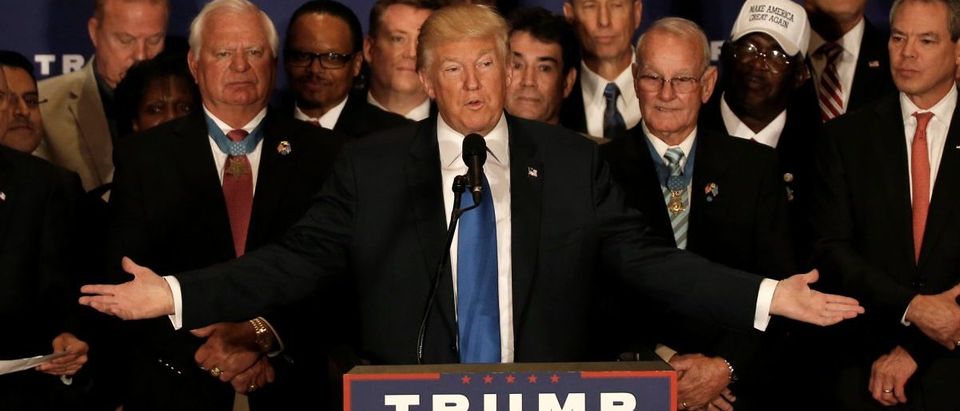Earlier this year, a mentally disturbed British national tried to assassinate Donald Trump by grabbing a police officer’s gun at a Trump rally in Las Vegas. Like most mentally disturbed would-be assassins, he failed.
But although the majority of assassination threats uncovered by the Secret Service can be attributed to the crazies—John Hinckley Jr. for instance, who was released from St. Elizabeth’s psychiatric hospital just this month, tried to kill Reagan to impress Jodie Foster—Donald Trump will likely not be assassinated by some poor schmuck saying the underpants gnomes told him to kill the giant with the golden hair and the foul mouth. Nor is it probable the killer would be some left-wing radical who thinks Trump is a 21st century version of Adolf Hitler. The candidate is simply too well protected for that.
Before the Secret Service was charged with protecting the president, in 1902—after the assassination of President McKinley—killing a president was relatively easy. It is not a coincidence that of the four sitting presidents who have been assassinated, three were in office between 1865 and 1901. To date, John F. Kennedy remains the only president who has been assassinated since the Secret Service assumed the heavy responsibility of protecting U.S. presidents 114 years ago, and many people still believe that assassination was anything but the amateur hour it appeared to be.
JFK’s brother Robert Kennedy remains the only presidential candidate to have been killed. Of course the Secret Service did not protect presidential candidates at the time. In 1968, Sirhan Sirhan could still wait in the kitchen with a snub-nosed .22 revolver and fire several times at RFK from a distance of just a couple of feet. But in 2016, this would be near impossible.
But although the chance of mentally disturbed and/or left-wing extremist amateurs assassinating Donald Trump is remote, the potential threat from another, far more powerful, rational and exclusive group could prove more serious.
Since Donald Trump announced his candidacy in June 2015, most of the subsequent tsunami of media coverage has focused on the socio-cultural part of Mr. Trump’s vision for America. The wall, the ban on Muslim immigration, the sexism, the racism, we ate it all up.
Far less attention has been given to Trump’s economic vision, though. That is understandable. Sexism sells, racism sells, islamophobism sells. But NAFTA and TPP, protectionism, currency manipulation, tariffs? Who would want to read about that? Who cares about stupid tariffs, complex trade agreements and penalties for outsourcing production abroad, right?
Well, people with money do. Not the ones who have a-few-million-in-the-bank-and-a-nice-house-in-the-Hamptons kind of money, the one percent, so to speak. No, people with real money, the one-tenth-percent (not naming any names here, you know who you are). And for many of them—and for the multinational companies they own and operate—Trump’s economic plans would be disastrous.
Trump’s economic plan to make America great again can be summed up in one word: neo-mercantilism, meaning using state power to stimulate export and domestic manufacturing while at the same time limiting import and penalizing outsourcing, thus growing the economy at the expense of other countries. The reasoning goes that the U.S. domestic market is so big (yuge!) and wealthy, it can be leveraged to force other countries to accept high tariffs without them slapping tariffs on American goods in return. The tariffs would make imported products more expensive, allowing domestically manufactured goods to remain competitive in spite of higher labor costs.
For a few years, this could indeed create job opportunities for American blue-collar workers, as Mr. Trump promises. But at the same time it would also erode Corporate America’s competitive edge, decrease its global market share and zap its drive to innovate, basically transforming the United States into France. And therein, as they say, lies the rub.
Trump’s economic views are decidedly not Republican. Former Republican candidates like Ted Kasich, Marco Rubio and Jeb Bush do not subscribe to it, and neither does Trump’s running mate Mike Pence. In fact, in a speech to the Detroit Economic Club in 2010, Pence said: “Protectionism and closing our doors to other countries does not help us, or people in the rest of the world. We must support expanded free trade to renew American exceptionalism and create jobs.”
It’s therefore safe to say that if Trump were to be assassinated, the candidate the RNC would elect in his place would likely be a proponent of free trade. Incidentally, any other Republican candidate would also have a much better chance to defeat the notoriously unpopular Hillary Clinton, who is only favorite to win against Mr. Trump because she is perceived as more rational and predictable.
One thing is certain: should conservative industrialists indeed decide Trump has to go, the professionals they would hire won’t have to rush the stage or try to grab other people’s guns. They will bring their own.
J.C. Peters is a legal philosopher and historian who frequently publishes about U.S. constitutional law, American and European history and foreign policy issues. He is also the author of the forthcoming political thriller The Dog and its Day, about an assassination attempt at the Republican presidential candidate, now available on Amazon and other major online retailers.
To learn more about J.C. Peters please visit www.JellePeters.com, Facebook, Twitter, LinkedIn and Goodreads.


